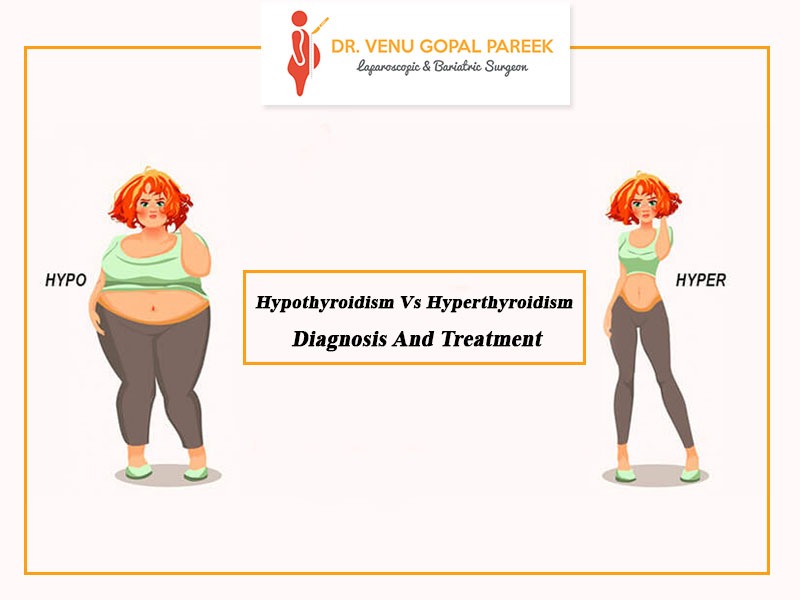
The human body consists of 11 basic systems, all of which are influenced and regulated by hormones produced by the Endocrine System. Hormones are chemical messengers that control bodily functions and range from basic needs such as hunger to essential functions such as metabolism and reproduction. If any of these hormones break down, it can cause serious problems.
The thyroid is a vital gland in the body that is responsible for producing a hormone called Thyroxine. Thyroxine helps regulate metabolism and protein synthesis, along with many other functions, including development.
When the thyroid gland produces too much Thyroxine, it is called Hyperthyroidism or an overactive thyroid. On the other hand, if too little Thyroxine is produced, it is called Hypothyroidism or Thyroid insufficiency. What are the differences between these thyroid diseases? Let’s have a look in this article provided by Dr Venu Gopal Pareek.
What is the Thyroid gland?

The thyroid gland is a small, butterfly-shaped organ at the base of the neck and is an essential part of the endocrine system. Although only two inches in size, these glands are responsible for producing and releasing hormones that control metabolism and regulate critical body functions, including:
- Heart rhythm
- Exhalation
- Weight
- Muscle mass
- Body temperature
- Menstruation
- Cholesterol levels
The thyroid gland produces inactive hormone thyroxine (T4) which becomes active hormone triiodothyronine (T3). Together, they are known as the thyroid hormone. These hormones, along with the hormones produced in the hypothalamus and pituitary, form a feedback loop known as the hypothalamus-pituitary-thyroid axis.
What are Hypo and Hyperthyroidism?

Hyperthyroidism: Excessive thyroid hormone production. In patients with Hyperthyroidism, the thyroid gland makes too much Thyroxine. This often speeds up your metabolism and causes sudden weight loss, fast or irregular heartbeat, sweating, and nervousness or irritability. Hyperthyroidism is usually seen in three ways:
- Inflammation of the thyroid gland: An inflamed thyroid gland causes too much thyroid hormone to enter the bloodstream, causing pain and discomfort that is usually short-lived.
- Thyroid nodules produce too much Thyroxine: This is common in Hyperthyroidism and hypothyroidism, and these nodules are often benign.
- An autoimmune disease called Graves’ disease: This condition causes the body to attack itself and the thyroid to make too much Thyroxine.
Causes for Hyperthyroidism:
- Too much iodine
- Graves illness (an autoimmune disease in which the body produces TSI, which is considered TSH, and causes the thyroid to secrete excessive amounts of T3 and T4)
- Toxic nodular goitre (nodular growths that produce excess thyroid hormone)
Thyroid Medication Toxicity
Signs and symptoms:
- Weight loss
- Heat tolerance
- Goitre (both)
- Restless, irritable
- Fast heart rate
- Hair loss
- Diarrhoea
- Unable to concentrate mentally
- Oily skin
- Nervousness
- Menstrual problems
Hypothyroidism: Low production of thyroid hormone. When hormone production in the glands slows down, so does metabolism, which is directly controlled by Thyroxine.

Causes for Hypothyroidism:
- Not enough iodine
- Hashimoto’s (autoimmune disease in which the body attacks the thyroid gland)
- Antithyroid toxicity for the treatment of Hyperthyroidism
- Thyroid removal
- A pituitary tumour (prevents the anterior pituitary gland from secreting TSH, which stimulates the thyroid gland to release T3 and T4)
Signs and symptoms:
- Weight gain
- Unable to tolerate cold
- Possible goitre from constant thyroid stimulation, which causes the thyroid to produce T3 and T4
- Tired
- Slow pulse
- Hair thinning and brittle
- Constipation
- Memory loss
- Myxedema: swelling of the skin (eyes and face) that makes it appear waxy
- Dry skin
- Depression
- Menstrual Problems (irregular or heavy menstruation)
The difference between the two types of Thyroid disorders :

- Hypothyroidism causes a decrease in hormones, while Hyperthyroidism causes an increase in hormones.
- Hypothyroidism causes a slow metabolism, fatigue and a general decline in bodily functions. Additionally, Hyperthyroidism can lead to weight loss, not weight gain. You can feel anxious instead of depressed.
- Hypothyroidism is more common than Hyperthyroidism in India.
It’s not uncommon to have an overactive thyroid after an inactive thyroid, or vice versa. If you have symptoms of Hyperthyroidism or hypothyroidism, talk to Dr Venu Gopal Pareek about treatment options.
How is thyroid disease diagnosed?

Sometimes, diagnosing thyroid disease can be difficult because the symptoms can easily be mistaken for other conditions. Fortunately, there are tests available to find out if your symptoms are due to a thyroid problem. These tests include:
- Blood test.
- Imaging test.
- Physical examination.
Blood test:
One of the surest ways to diagnose thyroid problems is with a blood test. A thyroid blood test is used to determine if your thyroid is functioning correctly by measuring the amount of thyroid hormone in your blood. This test is done by drawing blood from a vein in your arm. A thyroid blood test is used to diagnose thyroid disorders associated with hyper- or hypothyroidism. They include:
- Inflammation of the thyroid gland.
- Grave disease.
- Hashimoto’s disease
- Thyroid nodules.
- Thyroid cancer.
Special blood tests for the thyroid gland may include:
- Thyroid-stimulating hormone (TSH) is a hormone produced by the pituitary gland which regulates the balance of thyroid hormones – including T4 and T3 – in the bloodstream. This is usually the first test to check for thyroid hormone imbalances. Most often, a thyroid hormone deficiency (Hypo) is associated with elevated TSH levels, whereas an excessive thyroid hormone deficiency (Hyperthyroidism) is associated with low TSH levels. If the TSH is abnormal, measurements of thyroid hormones, including thyroxine (T4) and triiodothyronine (T3), can be done immediately to evaluate further problems.
- T4 Thyroxine: The thyroxine test for Hypo and Hyperthyroidism is used to monitor the treatment of thyroid disease. A low T4 level is seen in hypothyroidism, whereas a high T4 level can indicate Hyperthyroidism.
- FT4: Free T4 or free Thyroxine: This is a method of measuring T4 that removes the effect of proteins that naturally bind to T4 and can interfere with accurate measurements.
- T3: Triiodothyronine test helps diagnose Hyperthyroidism or shows the severity of Hyperthyroidism. Low T3 levels can be seen in Hypo, but more often, this test is useful in diagnosing and treating Hyperthyroidism when T3 levels are elevated.
- FT3: T3 free or triiodothyronine free is a method of measuring T3 that removes the effect of proteins that naturally bind to T3 and can interfere with accurate measurements.
- Thyroid antibodies
- Calcitonin
- Thyroglobulin
If you have concerns about your blood test results, contact Dr Venu Gopal Pareek.
Imaging test:
In many cases, examining the thyroid gland itself can answer many questions. Your doctor may order an imaging test called a thyroid scan. This allows your doctor to check your thyroid for any size, shape, or enlarged growth (nodule). This is a diagnostic procedure done with ultrasound which uses body tissues to transmit high-frequency sound waves. The echoes are recorded and converted into a video or still image. The ultrasound usually takes about 10 to 15 minutes.
Physical examination:
Another way to get a quick thyroid check is to get a physical exam at your doctor’s hospital. This is a straightforward and painless test in which your doctor will feel your throat for growth or enlargement of the thyroid gland.
Hyperthyroidism Treatment:

Hyperthyroidism can be treated with drugs, radioactive iodine, or surgery. If left untreated, bone loss or irregular heartbeat can occur. Antithyroid medications such as:
- Tapazole “Methimazole”
- PTU
- Iodide solution “Lugol’s solution
- Beta-blockers: Inderal
- Radioactive iodine therapy
- Thyroidectomy
Avoid salicylates and dietary supplements/iodine (increases thyroid hormone).
Hypothyroidism treatment:
There is no cure for hypothyroidism, but there are drugs that can treat it by improving thyroid function and restoring hormone levels. Hypo is most often caused by a condition called Hashimoto’s thyroiditis, in which the body attacks its immune system, and the thyroid stops producing hormones accurately.
Conclusion:
By assessing the adrenal glands, blood hormone levels and thyroid imaging, Dr Venu Gopal Pareek can diagnose precisely whether you have Hypo or Hyperthyroidism and create a treatment plan for you. Dr Venu Gopal Pareek’s team of experienced professionals can help solve your problems and improve your overall well-being and happiness. Call our office today at +91 91-777-77715 to schedule a consultation and take care of your health!







